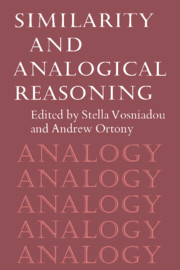Book contents
- Frontmatter
- Contents
- Preface
- List of contributors
- Similarity and analogical reasoning: a synthesis
- Part I Similarity and the structure of concepts
- Part II Analogical reasoning
- Part III Similarity and analogy in development, learning, and instruction
- Afterword: Comments on Parts I, II, and III: A framework for a theory of comparison and mapping
- Name index
- Subject index
Preface
Published online by Cambridge University Press: 22 October 2009
- Frontmatter
- Contents
- Preface
- List of contributors
- Similarity and analogical reasoning: a synthesis
- Part I Similarity and the structure of concepts
- Part II Analogical reasoning
- Part III Similarity and analogy in development, learning, and instruction
- Afterword: Comments on Parts I, II, and III: A framework for a theory of comparison and mapping
- Name index
- Subject index
Summary
The contributions to this volume are extensively revised versions of papers delivered at a Workshop on Similarity and Analogy held at the Allerton House of the University of Illinois, Urbana-Champaign, in June 1986. The purpose of the workshop was to bring together scientists working on similarity and analogy to explore current theoretical developments in this area and to consider the practical implications of this work for learning and instruction. The group was interdisciplinary in character and included scientists looking at similarity and analogy from psychological, computational, and educational points of view. The workshop was exciting, enjoyable, and rewarding, and we would like to take this opportunity to thank all the participants for helping to make it so.
Much of the workshop's original structure survived in the transition to this edited volume. The contributions in the first part deal with the issue of similarity. The second part includes the contributions dealing with analogical reasoning. Because analogies are fundamentally concerned with similarity at the level of representational structure, the chapters in the second part provide a theoretical context for those dealing with analogical reasoning by examining a number of questions about the nature of similarity and its relation to conceptual structure. The contributions in the third part discuss analogical reasoning in relation to learning and instruction. All three parts end with one or more chapters that offer commentaries, providing quite detailed discussions of most, although not all, of the other chapters in the book.
- Type
- Chapter
- Information
- Similarity and Analogical Reasoning , pp. xi - xiiPublisher: Cambridge University PressPrint publication year: 1989



